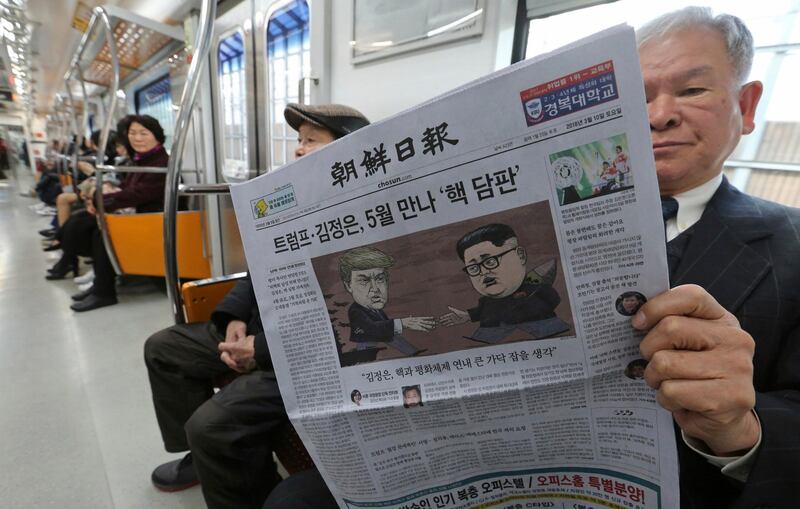It has been billed as the Trump administration's biggest diplomatic breakthrough, with both the United States and North Korea claiming credit for what has long looked an unlikely detente.
But with a summit over the North's nuclear weapons programme now planned, the US has cautioned that nothing has yet been achieved.
Indeed it has emerged that President Donald Trump enlisted the help of China's Xi Jinping to keep sanctions pressure on North Korea.
Despite the US leader's optimistic Tweet, the White House stressed that the US would continue to keep "maximum pressure" on Pyongyang.
The two leaders in a telephone conversation on Friday committed to maintaining "pressure and sanctions until North Korea takes tangible steps toward complete, verifiable, and irreversible denuclearisation," said the White House.
As aides scrambled to catch up with Mr Trump's decision - taken before consulting key confidantes - the White House sent mixed messages about conditions for the talks.
"They've made promises to denuclearize, they've made promises to stop nuclear and missile testing," White House spokeswoman Sarah Huckabee Sanders said.
"We're not going to have this meeting take place until we see concrete actions that match the words and the rhetoric of North Korea," she told reporters.
The US made "zero concessions" and "consistently increased the pressure" on Mr Kim, Vice President Mike Pence said on Friday, one day after U.S. President Donald Trump agreed to meet with Kim.
North Korea's invitation for talks "is evidence that President Trump's strategy to isolate the Kim regime is working," Mr Pence said in a statement released by the White House.
Mr Trump's bombshell announcement follows months of volatile relations between the two warring factions, including North Korea scrapping a planned meeting with Mr Pence in February and tensions rising to their highest following a battery of missile tests by North Korea.
_______________
Read more:
How Kim Jong-un is following the playbook of his father
Donald Trump's summit with Kim Jong-un could be a game-changing encounter
Oil edges up as US President Trump set to meet North Korea’s Kim Jong Un
_______________
Mr Trump threatened "fire and fury" if Pyongyang continued to threaten the US only for North Korea to carry out its sixth nuclear test.
But amidst boastful threats and juvenile insults the Winter Olympics in South Korea ushered in a renewed use of soft power, including a visit to the South by Mr Kim's sister Kim Yo Jong and Ivanka Trump's trip to the Pyeongchang Games. All of which has seemingly pacified the North, the South and the US.
According to two South Korean government sources, North Korea's Kim Jong Un joked about his image in international media on Monday while serving South Korean officials local spirits, including liquor made of ginseng and Pyongyang soju, several bottles of wine and cold noodles during their four-hour unprecedented visit to Pyongyang.
"The bottles kept coming," said an administrative source who had official knowledge of the meeting.
Mr Kim entertained the National Intelligence chief Suh Hoon and the head of National Security Chung Eui-Yong, telling them that President Moon could rest easy at night now that Pyongyang had decided not to carry out nuclear or missile tests while talks with the US were ongoing.
"President Moon has had a rough time chairing national security meetings at the break of dawn whenever we fired missiles," Mr Kim was cited as saying.
Last year Pyongyang carried out 20 ballistic missile tests, almost all of them in the early hours of the morning.
When the South Korean officials visited, no hard feelings were displayed and Mr Kim was the first to tackle sensitive topics, including the resumption of a military exercise between South Korea and the US that was postponed for a peaceful Winter Olympics, the Blue House official said.
"This is when we knew the efforts of North and South Korea taken after the Moon Jae-in administration began had paid off," said one participant of the North Korea visit.
The South's National Security's Mr Chung is also set to travel to China following his Washington trip.
Under pressure from Mr Trump, Beijing has backed a series of United Nations sanctions against North Korea, sending relations between the Cold War-era allies to a new low.
Beijing has repeatedly called for negotiations to peacefully put an end to tensions that have raised fears of nuclear warfare, after months of fiery rhetoric between Mr Kim and Mr Trump.
But China's foreign minister Thursday stressed that "the sincerity" of all parties to solve the nuclear crisis would be tested, noting that breakthroughs on the North Korean nuclear issue had collapsed in the past.
"Of course it takes more than one cold day to freeze three feet of ice," he said.
German Chancellor Angela Merkel was among the world leaders to hail the announcement as a "glimmer of hope," saying North Korea's nuclear drive "has been a source of great concern for all of us."





